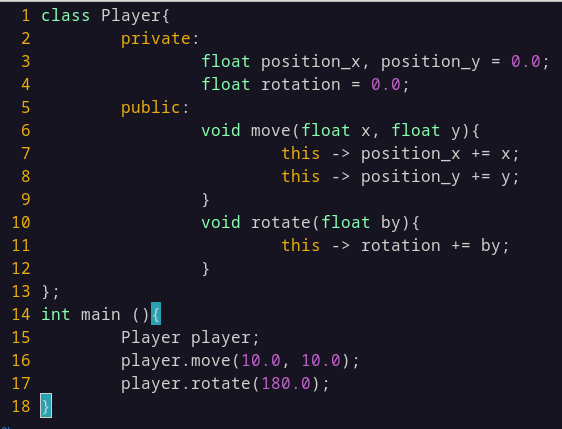I lived in a perfect OOP bubble for my entire life. Everything was peaceful and it worked perfectly. When I wanted to move that player, I do player.move(10.0, 0.0); When I want to collect a coin, I go GameMan -> collect_coin(); And when I really need a global method, so be it. I love my C++, I love my python and yes, I also love my GDScript (Godot Game Engine). They all work with classes and objects and it all works perfectly for me.
But oh no! I wanted to learn Rust recently and I really liked how values are non-mutable by defualt and such, but it doesn't have classes!? What's going on? How do you even move a player? Do you just HAVE to have a global method for everything? like
move_player();
rotate_player();
player_collect_coin();
But no! Even worse! How do you even know which player is meant? Do you just HAVE to pass the player (which is a struct probably) like this?
move(player);
rotate(player);
collect_coin(player, coin);
I do not want to live in a world where everything has to be global! I want my data to be organized and to be able to call my methods WHERE I need them, not where they just lie there, waiting to be used in the global scope.
So please, dear C, Rust and... other non OOP language users! Tell me, what makes you stay with these languages? And what is that coding style even called? Is that the "pure functional style" I heard about some time?
Also what text editor do you use (non judgemental)? Vim user here

Ever since I learned Clojure, I’ve ridden the functional programming train. Now I write Elixir for my day job and even though I still have a soft spot for Java, the first language I wrote professionally, I think OOP in general is a flawed paradigm that makes bad software. But I won’t rant about it, I know these things can be a matter of taste for a lot of people.
In a functional language like Elixir, each function belongs to a module, which is just a namespace that lives in its own file. You just call a function with the module prefix, like
There’s no inheritance, though there is polymorphism via something called Protocols. This makes it trivial to find the actual code you’re executing, which makes it so easy to debug stuff.
There are primitive data types, like integers, floats, and binary blobs (and strings are just binaries that are expected to be UTF-8), and then simple data structures like lists and maps. You can define structs, which are just maps with keys you define at compile-time.
I find that this leads to code that is way, WAY easier to design, write, read, and debug. I’m never stressing over trying to find the perfect abstraction for whatever I’m trying to write. I just write the function that does the thing I want. And you don’t need to remember a hundred different “design patterns,” either. There are a few simple patterns like map and reduce, and those are still just functions that transform data.
Ok I'm not that into programming yet, what is a namespace? I've seen it in some C code, where it says "using namespace std" for some IO stuff like cout and cin.
I’m using in the generic sense, as a bucket of function names. It’s kind of like how a class is a namespace for the methods defined on it. Two different classes can have a method with the same name, but you can’t define two methods with the same name & same args on one class.